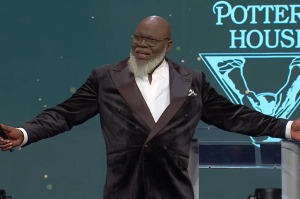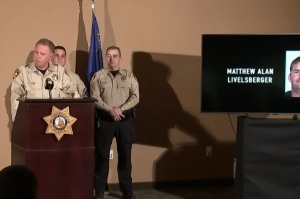38th Parallel interview
Robin: Tell me the story of 38th Parallel.
Aaron Nordyke: We're from Ames, Iowa, we all grew up together in high school. We were in the youth group together. Shane, our guitarist was the leader there, and he was our small group leader, and we eventually suckered him into joining the band.
Jeff Barton: We made a three-song demo independently that got some attention from radio stations in the area. Alvin Williams, who is from Word Records, sent out a mass email to all of the radio stations in the country asking, "What's hot in your area right now?" He got two responses back: one from a guy in Des Moines at a radio station we'd given our demo to, and one from a guy in Seattle who'd heard our music. They said, "You need to check out 38th Parallel." So Alvin emailed us, we sent him a demo, he came out to see us [perform] in Ames. He loved what he saw, flew us into Nashville to showcase for the label.
That quick.
That quick.
How do you describe your sound?
Mark Jennings: It's very melodic oriented. It's got a little bit of rap in there, but the rap isn't very urban. It's more poetic, it's definitely rock. It's got the heavier side of things. You could probably compare us to Linkin Park or Incubus, though we never intended to copy either of those bands.
How old are you guys?
20 to 24.
I assume that because you are with Squint, you have an eye cast towards the mainstream market. Is that correct?
Yeah. We wanted to be in a place where we wouldn't be boxed in, in any direction. We didn't want to be boxed in so that we're completely apart from Christians who might benefit from what we have to say, neither do we want to be boxed in such a way that the mainstream market doesn't get a chance to hear what we have to say. I think Squint is ideal for us, in the sense that it can really bring the message of Christ to both places in a tactful, reasonable, relevant way.
Then that begs the question, what do you have to say to both audiences?
I think what this band wants people in general to hear is that they are loved. God loves them, we care, Christianity is real and relevant to life. In specific, what we want to say depends on the person. As far as the people that don't know Christ, our goal is to simply say, "Hey, check it out. At least think about it a little bit." We don't want to shove anything down their throats, we don't want to be offensive, but we do want to say, "This is who we are. This is what we stand for. And you should give it a shot." For those people who are Christians, who have already given their lives to Christ, but are not necessarily living it to the fullest, we want to challenge them to reconsider that. "Hey, if you really believe Jesus is worth following, then follow Him." And to those who are really, really living for Christ, who are on fire for Him, we just want to encourage them to keep in that, to get out in the world and be salt of the earth, and engage culture where they're at. We want them to think, to learn how to defend their faith, with more than just reason -- with a heart full of love.
That's a lot of different kinds of people to reach all with the same music.
Oh, it's absolutely a challenge. But it's one that we invite. Bring it on. I think that God can accomplish anything; we don't do anything based on our own power. We have goals in mind, and we believe that it's a vision that God's given us, and if He wants to accomplish it through us, He's going to. That's all there is to it.
Breaking down the walls around the Christian subculture -- that's a trail that has most prominently, of late, been blazed by P.O.D., which has long since left those walls behind.
Well, P.O.D. is a good band to emulate, as far as how they've impacted culture. I'm ecstatic that there are more groups talking about trying to have a foot in both worlds. Simply because that's what we're supposed to do. We're supposed to be all things to all people. In music, there needs to be strong representation of good art in the world from Christians. We're supposed to be excellent at what we do, we're supposed to be the best at what we do. It would be amazing if we could take back the arts. Back in the day, the finest art you could find would be in churches. How great would it be if the same thing was true of musical art today?
The problem is, we're not making art for the world to see. We've become content at making it for ourselves.
Exactly, yeah. The one thing that we need to be careful of is that we're not using this as an excuse to become huge, mainstream superstars. We want to be really honest about our ministry, and to not neglect the church. That could be equally as dangerous, because the church also needs to hear a lot of what's being said regarding living the way that God has commanded us to live.
What are you passionate about, and what frustrates you?
What frustrates us are some of the attitudes from a lot of the Christian community regarding how to engage the world, or what to think of the world. Christ calls us to be in the world but not of the world. And while we have one interpretation of that, we get frustrated by people who have a different interpretation -- people who say, "Okay, we live in this world, but let's not be part of it at all." That's a really frustrating thing, and it's largely responsible for the creation of this "Christian bubble."
Our passion is love, the love of God.
Umm, our van frustrates me.
(Everyone laughs.)
We wake up not knowing whether it'll start every day. I'm passionate about the kids out there -- I want to be their friend, I want to love them, I want to point them in the right direction in every way, in how I live my life.
I would agree with Aaron in being frustrated about the bubble being created. I'm also frustrated about -- and I don't want to be overly general and say that this is true of all the church, because it's not, but it's true of a significant portion of the church, which is evident from the way the world is going. The anti-intellectualism; Christians haven't made a voice for thinking in the world. We haven't made a voice a whole lot in culture any more, as far as mattering. To a lot of people, we just don't matter, anymore. That frustrates me.
What I'm passionate about... I don't know if you've seen the movie Moulin Rouge, but there's this bohemian revolution that stands for freedom, beauty, truth, and love. Those are things that I'm very passionate about, because I think those are things that are realized maximally into their utmost of the person of Christ. Jesus is the hugest thing in the world to me, and all those things that come with Him -- freedom, beauty, truth, and love -- they just get me so excited, and get me going, and make me want to go out and embrace the world and obey God.
Shane Moe: I get frustrated by the van, too. It's a bummer. You're at the mercy of the equipment in the music industry. But I'm really passionate about wisdom, about understanding, learning, those sorts of things. For someone like me, I have to really make sure that I maintain a balance of how I relationally communicate that stuff to people, by loving them. Any kids I talk with, I'm more than happy to encourage them to read these good authors, or make attempts to understand different people. So much of the world thinks that Christians just sort of throw the truth at them and don't make an attempt to first understand them. It's cool to talk with people who don't agree with us, and ask them why they think the way the do, kind of get behind one another so that we understand where they're coming from. Christ had a big advantage in knowing everyone's heart and mind, so He knew exactly what method they would need. He spoke to a Pharisee one way, and he spoke to the woman at the well another way.
Nathan Rippke: I'm frustrated by the bubble, too. What also frustrates me is that it seems so hard to get Christian Music out there, and to get people to accept it. It's kind of ridiculous that it's so inaccessible sometimes. I don't know how that came to be. It just seems like if you're a band on a Christian label, then you get automatically labelled as a copy or a rip-off of a secular band. The comparisons can be really frustrating. Why can't it all just be music? I think a lot of Christian artists have that frustration, too.
Have you enountered any criticism on either side of the fence for trying to go from one to the other?
Not a lot. We used to. There was a time when we just weren't a very good band at all. We were proclaiming Christ to people and we got ripped on all the time, people would make fun of us behind our backs. And that really changed as we started getting better as a band, and now we just don't see it happening at all. So I firmly believe that, if you're excellent at your art, it's going to be appreciated.
One last question: why the name 38th Parallel?
Jeff found the name in high school. They were studying it in a class, and he thought it sounded cool. The more we've looked at it, the more we can see an analogy. The 38th Parallel is this demilitarized zone of hostility between North and South Korea. We are standing in the midst of all of these warring views of reality and paradigms and religions and frameworks out there, that all disagree and cut each other down. So it's kind of a battlefield for truth that we're standing in, proclaiming this absolute truth of Christianity is relevant for all peoples and places and times. So we're trying to bring peace to that region through what Christ had to say.
By Robin Parrish





























